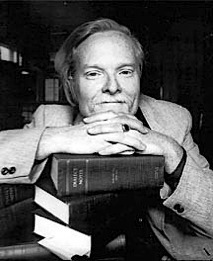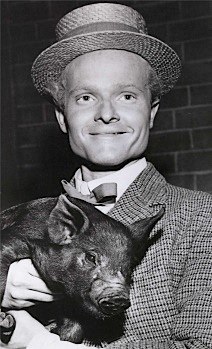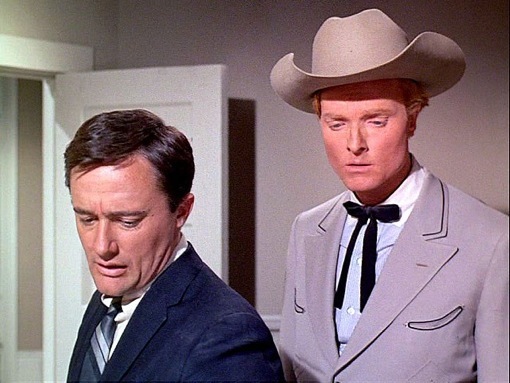Robert Easton
d. Dec. 16, 2011
Robert Easton, the character actor who mastered numerous accents to expand his own acting career, then became far more successful as Hollywood’s leading dialect coach, died Dec. 16 at his home in Los Angeles. He was 81.
Easton was the entertainment industry’s premier dialectician for more than 40 years, helping other performers lose their natural accents or temporarily gain new ones for acting roles, even as he continued his own acting career. His ad, in which he billed himself as the Henry Higgins of Hollywood and promised “accents cured – dialects strengthened,” appeared annually in the anniversary issue of Variety for many years.
He was born Robert Easton Burke in Milwaukee, but moved with his mother to San Antonio at age 7 after his parents divorced. As an adult, he legally changed his surname to differentiate himself from his father. He learned something about speech patterns at an early age, dealing with a childhood stutter that he helped tame by consciously adopting the slower, drawn out cadences of Texans. “When you have a big problem like that, you overcompensate,” he told the New York Times in 1998. “I found it easier to do voices other than my own.”
At 14, he won a spot on the popular radio show The Quiz Kids, broadcast from Chicago over the NBC Blue network. That led to dramatic roles on radio shows in Chicago and then in Hollywood. When radio waned in the early 1950s, he broke into movies and television but found himself confined to a narrow range of parts.
Easton’s Texas drawl, coupled with his tall, lanky build and naturally bemused expression, typecast him in roles he once described as “dopey deputy and halfwit hayseed.” He played a number of them — Chester’s uncouth but good-natured brother on Gunsmoke, wide-eyed assistant to a pixilated inventor on The Adventures of Superman, a country-bumpkin cousin whose visit embarrasses the Anderson children on Father Knows Best. He portrayed the same types in episodes of My Little Margie, Annie Oakley, The Bob Cummings Show, Riverboat, Wagon Train, Rawhide, The Real McCoys, The Andy Griffith Show and others. He also had small roles in such pictures as “The Red Badge of Courage” with Audie Murphy, “Comin’ Round the Mountain” with Abbott and Costello, and “The Beast from 20,000 Fathoms.”
Easton’s life and career changed after his appearance as “Sparks,” the Seaview’s radioman, in 1961’s “Voyage to the Bottom of the Sea.” He married an Englishwoman, June Grimstead, and moved to London for several years. With his nascent knack for accents, and determined to expand his range, Easton studied phonetics at University College London and mastered a wide array of speech types.
He also found work in England, appearing in one of the first episodes of The Saint in 1962, and in the Steve McQueen picture “The War Lover” (1962) and with Hugh O’Brian and Pamela Tiffin in “Come Fly With Me” (1963). In 1964, he provided the voice of Lt. “Phones” Sheridan, sidekick to Capt. Troy Tempest, in Stingray, the third “Supermarionation” series produced by Gerry and Sylvia Anderson.

Back in Hollywood, Easton found himself still cast as bucolic types in episodes of The Beverly Hillbillies, Petticoat Junction, The Munsters, Combat, Perry Mason and Run for Your Life. He played a hapless magician in the Burke’s Law episode, “Who Killed Merlin the Great?” and a small-town reporter who can’t quite believe that Will Robinson is who he claims to be in “Return from Outer Space,” the fondly remembered Christmas episode of Lost in Space.
One exception to his countless yokel roles was the Get Smart two-parter “The Little Black Book” in which Easton played a highbrow orchestra conductor and KAOS agent known as The Maestro.
But he was still another Texan bumpkin in “One of Our Spies Is Missing,” the fourth “Man From U.N.C.L.E.” feature film, released overseas in 1966. In scenes shot for the feature and not seen in the TV version (titled “The Bridge of Lions Affair”), Easton played a drawling, none-too-bright tourist who interferes with Napoleon Solo’s search for the rejuvenation process sought by everyone in the film.
Easton never quite escaped his hayseed typecasting, but as word of his mastery of dozens of American and foreign accents spread, other actors asked Easton to teach them. Eventually, this sideline became his main occupation. The list of students in his Variety ad grew every year — names ranging from Robert Vaughn, Robert Wagner and Robert Conrad to Anthony Hopkins, Al Pacino and Laurence Olivier. Forest Whitaker won the Oscar for his portrayal of Idi Amin in “The Last King of Scotland” using an accent Easton helped him develop.
Easton continued to expand his repertoire over the years, finally commanding some 200 regional American and international accents that he studiously absorbed in his travels. He also amassed a library of thousands of books about the world’s languages and cultures, and taught at the University of California at Los Angeles and the University of Southern California.
He continued to appear less frequently on television and in such films as “The Loved One,” “Paint Your Wagon,” “Pete’s Dragon,” “Pet Semetary II” and “Primary Colors.” In one of his last notable parts, Easton got to use an entirely new accent but he was virtually unrecognizable, buried under Klingon makeup as the judge presiding over Captain Kirk’s trial in “Star Trek VI: The Undiscovered Country.”






